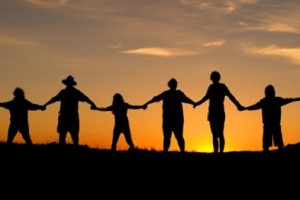Life Skills: Our Practice of Teamwork and Self-Reliance in the wake of Irene

As we have come to the end of the month and our discussions on Teamwork it was gratifying to see the use of teamwork in the families here at our school. Our students really got a special opportunity to display teamwork this week with our brush with Irene, the hurricane.
Some of the parents in the school started using the term Team “Last Name” as they told the stories of their family cleaning up after the storm or dealing in their own way with the inconveniences or even emergencies that they faced in the wake of the storm.
When the students returned to class we gave all the students the opportunity to tell their hurricane story, and reminded them that when they helped with work that needed to be done in or around the house they were practicing teamwork. We also reminded them that every team member has a special skill and or responsibility to fulfill on the team, and how thankful they could be that their parents had kept them safe during this emergency. They could rely on the team, just as the team relied on them.
While having an earthquake and hurricane in the same week was a bit disconcerting, we did get to practice teamwork – and even some of our word of the month in September; Self Reliance.
Life Skills: Teamwork – The Value of Contributing to “The Team”

Each one of us bring something special to the team that we are on. Even on our most important team, the family, not all of us are going to be good at all things. On every team there will those who play the role of encourager, compromiser, leader, clarifier, idea person, evaluator and recorder.
On small teams like your family, some may take on several roles as the team works towards a goal. But the point is that one person should not need to take on all of the roles, because everyone can contribute something. As a brief review let’s look at the different roles that can be played out on a team.
Encourager is the person who cheers the group on and finds ways to energize the group when motivation gets low.
Compromiser works on keeping the group harmonized. They make sure that many in the group are heard and understood.
Leaders who must be careful not to dominate the group, while at the same time keeping them focused and on track to reach the goals of the group.
Clarifier is the person who can summarize where the group is at this time and looks to make sure the group reaches a consensus.
Idea person sees the big picture and is full of creative ways of getting there, while they may not be too good on the details.
Evaluator is the person who likes to think things over and does not reach a quick decision. They will suggest and encourage looking at goals and solutions from different viewpoints.
Recorder is the person who loves to take the notes at a meeting and helps keep things moving, on time and schedule.
 How can you contribute with your best? Can you take on greater responsibility on a team? In the family we can train our children to take on different roles as they work on seeing what they are the best at and how to use all of these skills. It may start with simple day to day plans and later as they get older, having them help with vacation plans and other family goals.
How can you contribute with your best? Can you take on greater responsibility on a team? In the family we can train our children to take on different roles as they work on seeing what they are the best at and how to use all of these skills. It may start with simple day to day plans and later as they get older, having them help with vacation plans and other family goals.
Being on a team is important to our children feeling like they belong. Belonging to a group is key to building their confidence which in turn will affect their ability to lead. They will be less likely to succumb to bullying behavior and to stand up for others who are being picked on. Teaching teamwork at home builds happy family units, stronger students and future adults.
Life Skills: Teamwork In Sports or Family Results in Success

Have you ever seen or been on a team that just clicked, everything went well, even when there were obstacles? It is fun to be on a team like that. Have you ever been on a team that no matter how hard you worked the team never quite gelled and what you hoped to accomplish never quite happened. That can be very discouraging. So what is it that makes the difference in a great team and one that does not reach its potential? How does what we learn help us in our families, our most important team.
Great teams and teams that are fun to be on may not always win. But on great teams, that never seems to persuade them from having a positive attitude. Even when things do not go as planned or hoped for, the members of the team always look on the bright side and are willing to give credit to each other and appreciate the effort that they put into the task at hand.
Great teams display great sportsmanship. No matter if they win or lose, they are fair and kind both to each other and those that they played against. They put forth their best effort and play by the rules, never cheating or lying. Teams that display sportsmanship are willing to compliment others for a job well done instead of bragging, criticizing or making fun of others on or off of their team.
Great teams and teammates will still make mistakes and not do the job they were assigned as well as they wished they had. But instead of trying to find someone else to blame, they quickly acknowledge their mistakes, learn from them and then work on doing better the next time. All of these things are true of teams that we play and work on, but they are also true of our most important team – our family.
In our family we want to display a positive attitude, even when things do not go the way we would have liked or planned. If there is an obstacle, we talk to others in the family, prioritize what our values are, make choices that are best for the team – not just one individual. Great families create a culture of being fair to all and understanding that fairness does not mean you will get your way all of the time. Great families work hard  together on projects that meet the values and mission of their family, with everyone contributing what they are able to their projects. They are willing to listen to each other and set their own ego’s to the side for the good of the team.
together on projects that meet the values and mission of their family, with everyone contributing what they are able to their projects. They are willing to listen to each other and set their own ego’s to the side for the good of the team.
Developing our values and mission as a family and then working together to meet our goals as a team, teaches our children about teamwork and creates a very close and strong family. If someone were to ask you what is your mission / goals as a family, you want to be able to state it simply and clearly. Having the values spelled out and a mission understood is the first step in creating a great team.
Life Skills: Teamwork – The Power of We
The power of WE can affect our family, our schools, and our community. I hope to use this power in our efforts to bring a culture of peace to our schools for all students. Will you join with me in:
Bully Prevention Partners
Life Skills: Finding Ways To Make Teamwork A Part of Everyday In Our Life

When we work together our team is strong, we accomplish much more, and the team is successful. Our most important team we are on is our family. How can we practice teamwork at home? Working together to clean up, do the dishes, work in the yard. Almost every activity around the house can include the whole family. Think about how each member of the family will feel when everyone chips in to help. It certainly is not up to just one person in the family to be responsible for all the cleaning.
Children can also be included as they get older in planning outings for the family. This feeling of belonging and being a part of a team will help them withstand peer pressure in school and in life, as well as be willing to include others in their activities.
When teamwork is learned at home, children will be more willing to assist teachers and other students in school. It may be helping to clean the classroom, or helping other students learn the lesson of the day. In fact as children develop teamwork they are also developing empathy. They will be more willing to stand up to anyone who may bully another student or to welcome a new student into the school. Sometimes new students can have a hard time feeling like they fit in and those who practice teamwork can be of great assistance.
Finally in the community, teamwork is so important to accomplish goals that none of us could do on our own. It is this type of teamwork that Balanced Life Skills is hoping to find in our Bully Prevention Partners website. It will only be all of us working together that we can accomplish the our goal of a culture of peace in the classroom for all students.
